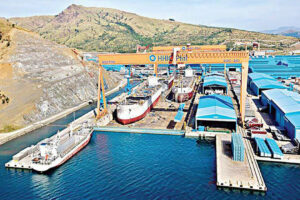THE Philippine shipbuilding industry is being held back by the dearth of local suppliers of key marine equipment, driving up costs and downtime for shipyards, the Organisation for Economic Co-operation and Development (OECD) said in a report.
In its “Peer Review of the Philippines’ Shipbuilding Industry” report, the OECD said the absence of local manufacturers of engines, turbines and energy systems is limiting the industry’s ability to become self-sufficient and competitive.
“Reliance on imported components further exposes the industry to supply chain vulnerabilities,” it said.
“Developing local manufacturing capabilities for selected technologies and products or incentivizing international manufacturers to establish operations in the Philippines could strengthen the shipbuilding and repair industries.”
The Philippines was the fourth-largest shipbuilding country in 2022, on the back of major shipyards like Tsuneishi and Seatrium.
The OECD said foreign investment from Japan, South Korea, and Singapore have driven this growth in the industry, but production has declined since peaking in 2014-2015. Meanwhile, vessel imports surged post-2021.
The production of ships at Philippine shipyards rose sharply in the 2010s and then dropped significantly, particularly after the failure of South Korea’s Hanjin Heavy Industries, which operated a yard in Subic.
Despite this, the OECD said the ship repair industry is “strategically positioned” to corner the growing demand in Southeast Asia, with East Asia and Europe as its largest foreign markets.
Post-pandemic recovery has seen substantial growth, with a peak of 60 repair activities in the third quarter of 2023, it added.
Some 66% of the country’s 186 shipyard facilities require rehabilitation, it said.
Despite this, the OECD also noted that the maritime sector continues to be a major employer, with 1.8 million workers in 2021.
In an effort to revitalize the shipbuilding industry, the government is pushing policy reforms through the Maritime Industry Development Plan 2019-2028.
Legislators also filed two measures in the House of Representative, including House Bill (HB) No. 2597 which aims to provide government support, including industry aid and research and development assistance, to help scale operations and reduce business costs.
Meanwhile, HB No. 2598 seeks to provide fiscal incentives to shipbuilding companies, including exemptions from value-added taxes and removing duties on imports of capital equipment, which could help unlock investment in the industry. — Aubrey Rose A. Inosante


















